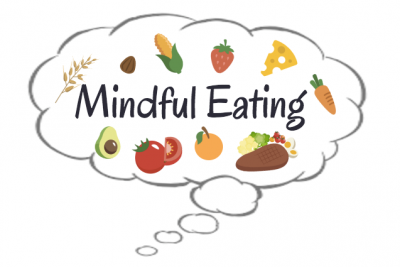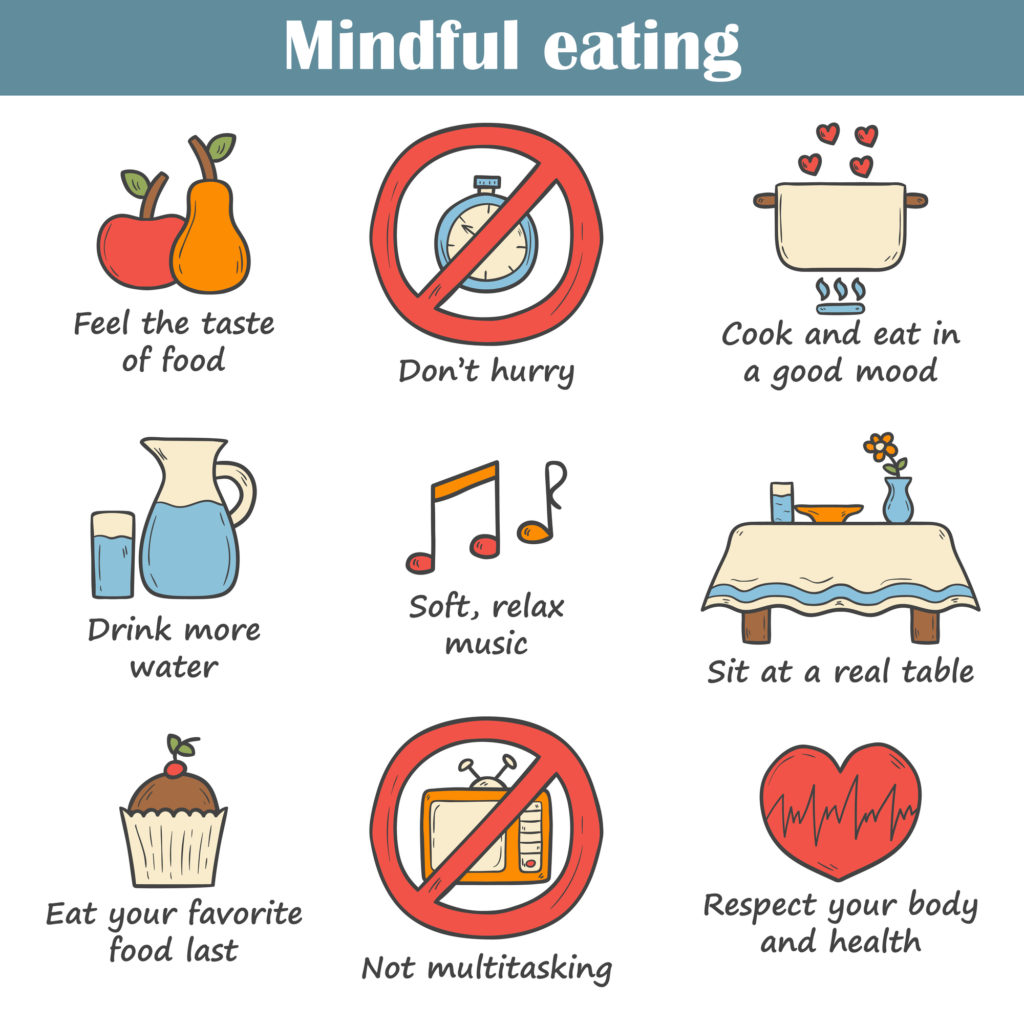
Ways to practice Mindful eating
Mindful eating is a practice that helps you to be more aware of your food experiences, emotions and sensation .Mindful eating is an art to be present.
There are several ways by which you can practice mindful eating:
1. Engage your senses : which means to say whenever you are eating u should feel the food whatever goes into your body ,firstly see the food and enjoy then you got to feel it by your hands then smell the delicious food and then finally enjoy the taste of the food ,by doing all this you are engaging all your senses and enjoying the every bit of your food.
2.Chew slowly : when you are eating your food you got to chew your food thoroughly so that its nicely ground and its easy for absorption.
3.Cook mindfully : Which means to say when you are cooking make a healthy options in your cooking by using the right ingredients and right quantity of the required ingredients.
4. Eat slowly : Which means to say whenever you are eating your food you should have time to enjoy your food ,if you eat in rush you cant chew your food thoroughly which is a bad practice and when you just gulp your food yu end up eating more than the required quantity.
5. Eliminate distraction : Which means to say when you are eating your food its very important to sit and enjoy your food and not having food sitting in front of a TV or having food while you are using any of your gadgets. This in turn results in eating unhealthy food and also eat more than required quantity.
6. Learn your hunger clues : Its very important to understand your body hunger clues ,you have to eat only when your hungry, having food on time will not give wrong hunger clues.

A mindful eating can be achieved by your determination, only when you fix your mind, concentrate and practice the habit you can achieve mindful eating.
To have this you have to engage yourself in the physical activity , breathing exercises and meditation.
As we know diet and exercise go hand in hand ,it holds good in all aspects of food.
When you practice mindful eating you will be able to identify :
Physical and emotional hunger.
It helps you to deal with eating dis orders.
It helps you in weight loss.
It helps to reduce binge eating.
Mindful eating is based on mindfulness, which is a Buddhist concept.
Mindfulness is a form of meditation that helps you recognize with your emotions and physical sensations.
Its used to treat many conditions including eating dis orders , depression, anxiety and other food related behaviour.
Why should we practice mindful eating:
In todays fast paced society we have lot of options with food , if we are not mindful in selection of food we end in un healthy conditions, we have wide wide variety of junk foods which are very very attractive to kids and adults, if we don’t have the sense of choosing a good or healthy food we may have to pay heavy both on BILL’S AND PILL’S.
The basic concept of mindful eating would be o know what to eat , how much to eat and how you compensate with your next meal if u end up eating more than required. If u practice this way of mindful eating you will gradually make this as a part of your life style and once it becomes a part of your life style then its a part of you which can never go away.
By paying close attention to how you feel as you eat—the texture and tastes of each mouthful, your body’s hunger and fullness signals, how different foods affect your energy and mood—you can learn to savour both your food and the experience of eating. Being mindful of the food you eat can promote better digestion, keep you full with less food, and influence wiser choices about what you eat in the future. It can also help you free yourself from unhealthy habits around food and eating.
Benefits of mindful eating:
Eating mindfully can help you to:
- Slow down and take a break from the hustle and bustle of your day, easing stress and anxiety.
- Examine and change your relationship with food—helping you to notice when you turn to food for reasons other than hunger.
- Derive greater pleasure from the food you eat, as you learn to slow down and more fully appreciate your meals and snacks.
- Make healthier choices about what you eat by focusing on how each type of food makes you feel after eating it.
- Improve your digestion by eating slower.
- Feel fuller sooner and by eating less food.
- Make a greater connection to where your food comes from, how it’s produced, and the journey it’s taken to your plate.
- Eat in a healthier, more balanced way.
How to incorporate mindful eating in our lives:
- For most of us, it’s unrealistic to think we can be mindful for every bite or even for every meal we eat. The pressures of work and family sometimes mean you’re forced to eat on the go or have only a limited window to eat something or risk going hungry for the rest of the day. But even when you can’t adhere to a strict mindful eating practice, you can still avoid eating mindlessly and ignoring your body’s signals.
- Perhaps you can take a few deep breaths before eating a meal or snack to quietly contemplate what you’re about to put into your body. Are you eating in response to hunger signals or are you eating in response to an emotional signal? Maybe you’re bored or anxious or lonely?
- Similarly, are you eating food that is nutritionally healthy or are you eating food that is emotionally comforting? Even if you have to eat at your desk, for example, can you take a few moments to focus all your attention on your food, rather than multitasking or being distracted by your computer or phone?
- Think of mindful eating like exercise: every little bit counts. The more you can do to slow down, focus solely on the process of eating, and listen to your body, the greater satisfaction you’ll experience from your food and the greater control you’ll have over your diet and nutrition habits.
REFERENCES:
https://www.healthline.com/nutrition/mindful-eating-
